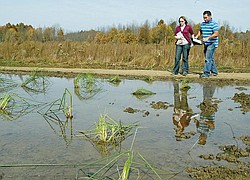MetroParks wetlands project now in final phase
RESTORATION PROJECT: Kirsten Peetz, left, and Justin Rogers of Mill Creek MetroParks examine a pool of standing water at the wetlands restoration site off Western Reserve Road in Canfield Township. Construction on the site began in July and culminated with the planting of native trees, shrubs, grasses and flowers last week.
The 48-acre wetlands should be ready for the public in the spring, a park official said.
By Jon Moffett
CANFIELD — A project to revert 48 acres of farmland to its original form as wetlands is nearing completion.
Now that native plants have been reintroduced, it’s up to nature to do the rest.
Justin Rogers, project manager and landscape architect with Mill Creek MetroParks, said the human element of the project soon will be nonexistent.
“This is the final phase of the construction project,” Rogers said. “We’re planting the trees and shrubs, wetland plants and also seeding the site with native grasses, sedges and wildflowers. So, this is the final phase of construction here at the restoration site.”
The project, which began in July, is an ecological-restoration program. The land was excavated and shifted to create several pools of standing water and various berms and terraces on the site.
Brookside Construction Services Inc. was awarded the project, and a crew from the Medina company was finishing up work by planting a few native trees and shrubs. The plants will germinate through the winter, and the site will be ready for a spring ribbon-cutting ceremony, Rogers said.
Rogers and other MetroParks employees will continue to monitor the site to ensure the vegetation is maturing and the construction isn’t compromised. If everything goes according to plan, the site will be open to the public in the spring.
“We want to let some of the seeds mature and stabilize some of the earthwork that was completed, so that when we do allow the public to come out, it is a safe and pleasant experience for them,” he said.
Kirsten Peetz, environmental land manager with the MetroParks, said the park district will be working diligently behind the scenes to ensure the site’s natural state.
“Once this is all planted and starts growing ... I’ll be responsible for creating management plans and make sure this part of the land is growing right and restoring the other coordinated habitats.”
She also spoke on the significance of the site with respect to the MetroParks.
“This is one of the first — or at least at this point the biggest — wetland restoration that Mill Creek MetroParks has undertaken,” she said. “And with this property being adjacent to Mill Creek itself, it’s doing a lot of good for water quality and wildlife habitat in the Mill Creek corridor.”
In addition to its benefits to the park, Peetz said the ultimate winners are patrons who take advantage of the site.
“It’s going to offer passive recreation, so they can walk the trails and the berms through the wetland,” she said. “And they’ll be able to view birds and different wildlife as well as plants that are growing. It’ll be a nice place to come and walk around and see lots of the good bits of nature.”
jmoffett@vindy.com
 43
43

